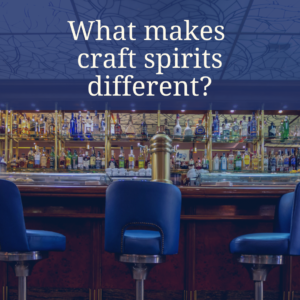
When I began my role as Marketing Manager at Elevated, I’d never heard the term “craft wine” or “craft spirits.” Turns out, I wasn’t alone. Much of Elevated’s friends and followers were unfamiliar with the term, too. After a bit of research and an interview with Tony Ursone, Head of Sales at Outer Banks Distillery, I found the answer. Well, sort of. Let’s delve into the meaning and what makes “craft spirits” different then the rest.
What are “Craft” Spirits?
“Craft” spirits means different things to different people. According to an online article by the Growler, craft implies the product was made without the addition of any pre-made spirits. Meaning the distillery starts from scratch. They take the grains or molasses, ferment, distill, and bottle it themselves. The distillery is a complete one-stop shop.
Another definition I found stated described companies who label their product “craft” but don’t produce their own booze. They purchase pre-made spirits like whiskey, bourbon, or rye from a large company like Midwest Grain Products. The company then creates their own proprietary blend of liquor using pre-made liquids and labels it “craft.”
This practice falls in the gray area for me, but there’s no regulation around marketing tactics in the spirits industry, so it’s legal. I know I’ve bought store-bought cookies and claimed I made them as my own, but letting the whole world think I made the cookies as opposed to my friends is entirely different.
The third factor I found for “craft” focuses on the size of production. According to the American Craft Spirit Association (ACSA), a company must produce less than 750,000 gallons annually to fall under the “craft” title. That is a LOT of booze for any small-time distillery.
The Growler article goes on to discuss how “craft” is how the liquor is made. Grandparents, parents, and kids being “hands on” and passing the proverbial family secret recipe and the business down to each new generation. Remember Bush’s Baked Beans commercials? They have a family recipe as long as their dog, Duke, keeps his mouth shut. Their beans are on shelves nation-wide, but their image depicts them as a small company with a prized secret recipe. Are they consider “craft” baked beans producers?
Tony Ursone said, “Craft is just a buzzword. It could be one barrel or one thousand barrels. The true thing about craft is about the person or group who makes their own spirits.”
I have to agree with Ursone’s definition. Even though the ACSA provided a definition that included size and production, it also stated “the term craft is in the eye of the beholder.” Use whatever definition feels right for you.
Why Should I Buy Craft Spirits?
When I was in my 20s, I found the cheapest liquor at the store. I might’ve looked one row above the bottom shelf booze if I had the funds, but that rarely happened.
But now that I’m well, uh, a few decades older, I want the superior, smooth from start to finish spirits. The liquor that exudes quality and won’t leave me feeling like garbage the next day. Although, let’s face it. I can be lax on my water consumption for a day and feel hungover, without drinking any alcohol, the next day.
That’s the beauty of craft spirits. The quality is exquisite. The taste lures you in and the bottle wants to tell you a story of its journey. The distillers of these hand-crafted beauties can tell you about each barrel, batch and variety of spirit they carry. They know the subtle differences between batches, the flavors produced using different barrels, and the exact measurements of each ingredient in every blend. Each bottle is a new, beautiful creature they’ve created just for you. It’s enough to turn any first timer into a loyal customer.
Ursone put it best. “I think that flavor profile and story play a part. The fact that you can talk to someone, have questions answered, and you can get a better flavor profile from smaller than mass produced because there’s more care and nuances in it.”
As a consumer, I’ll pay higher prices for better quality products. The bonus is I’m also supporting a small business, and can talk to someone about the product. As a bar or restaurant owner, you can charge more for superior products and your consumers will gladly pay it because they can taste the difference, too.
Are you Ready to Try Craft Spirits?
If you’d like to expand your palette, support small businesses and amaze your tastebuds, we can help. At Elevated, we offer craft spirits from two companies. We love the passion, commitment and paths they’ve traversed to produce their prized products.
Outer Banks Distillery has a delightful product and equally delightful story behind their Kill Devil Rums. It’s four guys who shared a passion for good rum, and turned a dream into a reality. They attended classes on distilling, learned the trade, and tested endless recipes. The schooling paid off with the growing success of the high caliber rums they’ve created. And the honey pecan rum is hands-down my favorite. So smooth. So sweet. So delicious. Their social media game is pretty strong, too. (You can find them at outerbanksdistilling.com)
Leatherwood Distilling is a veteran-owned business in Nashville. The owner and head distiller began making booze while serving overseas. He’s like the MacGyver (did I just date myself with that reference?) of creating liquor from Skittles, bread and water for his fellow soldiers. He’s a retired Green Beret, and has produced a stellar line of spirits that includes bourbon, whiskey, rum and moonshine. Elderberry moonshine, anyone? It’s a must try! And don’t get me started on his #fuklehead bourbon followers. (They’re at leatherwooddistillery.com)
Both distillers meet the ACSA’s definition of “craft” spirits, but more so, they’ve honed their skills to produce truly delicious spirits. Both are on the rise and deserve your attention. Reach out to Elevated if you’d like to arrange a tasting.
